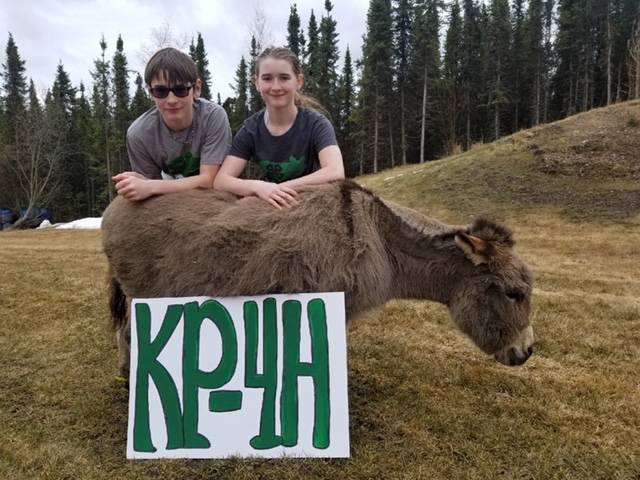There will be no Kenai Peninsula Fair in Ninilchik this fall, but the annual 4-H Junior Market Livestock Auction will carry on, one way or another.
“At 4-H, our motto is ‘To make the best better,’ so that’s what we’re doing,” Cassy Rankin, program assistant for the Kenai Peninsula District 4-H Program, said on Wednesday. “It’s obviously going to look a lot different this year, but I love how our 4-H-ers persevere and they just do the hard things anyway.”
Rankin said she and the other program coordinators knew well before the fair was canceled that their annual auction would not be the same. This is partly because the 4-H program falls under the University of Alaska Fairbanks’ Cooperative Extension, and the university system has been relatively conservative in regard to reopening or returning to normal, Rankin said.
Rankin and the rest of the 4-H Auction Committee met Tuesday night to “put all the puzzle pieces together” and figure out what the online livestock auction would ultimately look like. While the plans have not yet been finalized, Rankin said that an announcement would be coming soon with the details on the auction.
“Our livestock judges are completely onboard with doing the judging by way of the internet and photographs,” Rankin said. “The auction itself — that’s the part we’re still working on. Whether we’ll go with an outside auction service or use some of the software that we’ve all become really familiar with in these last few months, like Zoom or a Google Hangout kind of thing. Those are the little pieces we’re still putting together.”
Rankin said that in a survey she sent out a few weeks ago to frequent auction attendees, the overwhelming response was that people still wanted to attend the auction, regardless of what it looked like.
Much of the livestock sold at the auction every year is bought by local businesses, and normally the 4-H kids would be visiting these businesses ahead of the auction to give a pitch about the 4-H program and the animal that they’ve raised. While that wasn’t able to happen this year, Rankin said that businesses should expect to start getting calls from the kids making their sales pitch in the next few weeks.
There are 40 kids who are raising livestock this year — including four of Rankin’s own children. Rankin said that this year’s stock includes pigs, cattle, sheep, turkeys, rabbits and more.
“This is the time of year when our kids are normally at each other’s farms or having workshops or meeting with their superintendents. We’re all kind of bunched up in a group learning from one other,” Rankin said. “So they’ve had to adapt to online workshops.”
Through March and April, Rankin said, the 4-H kids were participating in online workshops, where one 4-H student would instruct the others in things like watercolor painting, photography, raising livestock or giving a speech.
In May the kids got their animals, and Rankin said 4-H unplugged for a bit during that time, because sitting in front of a computer screen was starting to get a little old.
Now the weekly virtual workshops, or “Zoom Barn Booms,” have resumed, and the kids are busy showing off their animals and comparing projects with each other.
Wednesday night, for example, was set aside for the kids who are raising rabbits this year, with a livestock expert answering the kids’ questions about proper feeding, growth and other aspects of animal care.
“That part has been challenging, you know, for my own children, my 4-H kids,” Rankin said. “It’s just not how we’re used to things going. But like I said, 4-H-ers will make the best better no matter what they’re faced with. … We’re really proud of them and their perseverance and their hard work in agriculture.”
Updates about the Junior Market Livestock Auction and the Kenai Peninsula District 4-H Club can be found at kp4h.com or the Kenai Peninsula District 4-H Facebook page.
Reach reporter Brian Mazurek at bmazurek@peninsulaclarion.com.

